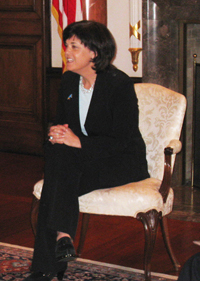
Susie Roos, wife of Ambassador to Japan.
In February, we asked our readers to “interview” Susan “Susie” H. Roos by submitting questions to her via American View. We received a variety of interesting questions on work/life balance and many other topics from readers in different parts of Japan and the world. Susie Roos splits her time between San Francisco, California – where she is a partner at a full-service employment and labor law firm – and Tokyo, Japan, where her husband is the U.S. Ambassador to Japan. She and her husband have two children, daughter Lauren, age 22, and son David, age 17.
A reader in Tokyo: Who is your role model and why?
Susie Roos: I always felt that I wanted to have it all – a great job and a great family. I didn’t see any reason why I couldn’t do both. Men do both, so why can’t women. My mom is a great role model. She went back to college after we were in school, graduating the same year that I graduated from college. She then went to work full-time as a travel agent. But she always loved what she was doing. When she was a full-time mom, she loved that. When she went back to work, she loved that. So she taught me that any and all options are possible – just so long as you love what you are doing.
A reader in the U.S: What made you decide to become a lawyer and specialize in employment and labor law?
Susie Roos: I was always fascinated by the lawyers I would see on television and in the movies. One of my favorite characters was Perry Mason, a lawyer in a very popular courtroom drama, who always made a terrific closing argument in the last five minutes of each episode. My mom would tell me that I should be a lawyer as I was making my many “persuasive arguments” as a teenager, so it always seemed like my natural profession. After graduating from college with a degree in American Studies at Stanford, I worked for one year as a paralegal in large San Francisco firm. I really enjoyed the work and decided to apply to law school. I entered law school with the idea of becoming a trial lawyer. There was also a program popular when I was in law school called “L.A. Law” about a law firm in Los Angeles, which made the law profession seem quite exciting. Not that I was totally motivated by television shows – and real life isn’t exactly what they show on television – I actually liked dealing with legal issues. Specializing in employment was also an easy decision because I get to deal with real people’s issues, such as how to help a client deal with a poor performing employee while at the same time making sure the employee is treated fairly. I am usually representing employers and companies so I don’t end up “vindicating” any one person’s “rights,” but I do get satisfaction from helping a company understand the laws against discrimination or harassment.
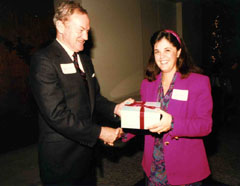
Susie Roos when she first made partner at her law firm in 1991.
A reader in Chiba: When you travel back and forth between the United States and Japan, how do you refresh your mind and body when you feel tired due to jet lag?
Susie Roos: I have been very fortunate to not feel too jet lagged. I try to drink a lot of water on the airplane and not to drink any alcohol. I haven’t had that many trips, but I have heard varying advice – some say to always sleep and some say to stay awake. So far, I have been staying awake – reading magazines and books or watching movies. My last trip was very fortunate in relationship to timing – I was able to watch several of the Academy Award nominated movies just in time for the Oscars! When I get to California (usually in the morning) I try to stay awake until the evening and get right onto California time. I do the same thing in Japan.
A reader in Tokyo: Are there any words of inspiration that have encouraged you as you pursue your career as an attorney?
Susie Roos: In the end it’s your reputation and integrity that matter. I have always tried to follow that advice in everything that I do.
A reader in the U.S: When your children were small, how did you balance your career and your family?
Susie Roos: I was always very fortunate to have wonderful help at home. I had a babysitter that would come to our house each day to watch the kids. But my family always comes first, so I would try not to miss any major school events or sports games. Again, I was lucky enough to have employers who understood that family comes first. And then, about 15 years ago, I started my own firm and I became the owner of the business and my partners had the same priorities as I did. However, sometimes you have to make compromises. I remember the first Christmas after our daughter was born. She was six months old and we were planning a ski trip with the entire family. However, another lawyer left the firm right on the eve of a major trial and I was put on that trial. I asked if I could still go skiing and the partner said, “You do what you think is right.” So I cancelled the ski trip and stayed to help on the trial. I was still with my family, but sometimes you have to make compromises to fulfill your work responsibilities. It all works out in the end. My kids turned out great (a biased opinion) and I ended up making partner at the firm.
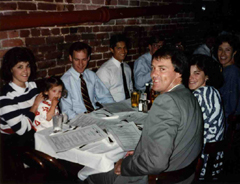
Susie Roos participates in a social event for her law firm accompanied by daughter Lauren (at left).
A reader in Shizuoka: As you take on a variety of roles, do you ever feel angry? If so, how do you deal with your anger?
Susie Roos: I can’t say that I’ve felt angry, but I think that it is natural to feel a certain amount of stress when faced with a lot of competing demands from work and home. At those times, it’s important to set priorities and make sure that the important tasks are done first and done well. Some less important tasks may not get done in the way that you want, so you have to learn to accept that. I do think that it is important to find time to engage in activities or hobbies one enjoys to alleviate stress. This could be arts, sports, social activities, reading, cooking, or enjoying the outdoors. While it may seem almost impossible to find the time, doing so can help you come back to the routine tasks with new energy. I try to exercise every day or at least 5 days a week. I get up early in the morning to exercise so that I can be home in time to get our son to school and get myself ready for work. At first it was hard to get up early, but I forced myself, because the overall benefit outweighs a few extra minutes in bed. I feel more refreshed throughout the day. I also try to go to as many sporting events as possible. I love all types of spectator sports. (I also love to play golf, tennis, and snow ski.) I try to go to as many college games as I can. Living in the Bay Area, I can go to most Stanford sporting events –football, basketball, and baseball, not to mention volleyball and soccer. I also love to go to San Francisco Giants baseball games and NBA basketball games – even though our NBA team, the Golden State Warriors, hasn’t been doing too well. This is relaxing for me and makes me forget about the stress. I also love to shop, so browsing through the stores is relaxing for me. John would say I do more than just browsing …
A reader in Chiba: What foods from home do you crave when you’re in Japan?
Susie Roos: Japan has so much wonderful food, I haven’t really been craving anything. I particularly enjoy okonomiyaki, which is quite different from the Japanese food such as sushi or sukiyaki that I am most familiar with in Japanese restaurants at home. That of course hasn’t stopped me from eating plenty of sushi! We actually love all types of Japanese foods. Oh, I guess I have missed Mexican food, which is very popular in my home state of California. That was the first restaurant I went to when I came back. I love chips and salsa and enchiladas. But my favorite part of going to a Mexican restaurant is the frozen margaritas. Don’t get me wrong, I’m not a big drinker and typically only have one, but I love frozen margaritas so much that John actually bought me a frozen margarita machine for one of my birthdays.
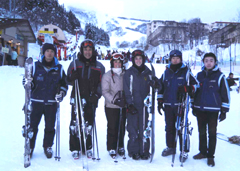
Ambassador Roos (second from left) with Susie and David on a ski trip.
A reader in the U.S: What was your initial reaction when you heard that your husband was going to be posted in Japan?
Susie Roos: I was very excited for the opportunity for John and it was a huge honor. However, I was a bit nervous about being so far from our extended family and living abroad – something we had never done. I was also worried about leaving my law partner and my law practice. I have worked full-time my entire life and I was not sure what it would be like being away from “the office.” I have to say, after being posted here since August, I had no need to worry. Japan has been unbelievable. I have been able to work long distance with my firm and it has worked out remarkably well. I can handle most things by email or telephone and my partner does the day-to-day litigation work. I do miss our family (especially our daughter who is a nurse in Los Angeles), but I have a close relationship with my parents and with my husband’s parents, and fortunately they have been healthy and have all been able to visit us in Japan. Their visit was a very special experience for them and for us. John’s parents were able to accompany him to Hiroshima, so that it was really a three generation visit to that historic sight – my son, John, and his parents. My parents also have come to visit and we enjoyed exploring Tokyo. We also had a wonderful trip to Hakone with a breathtaking view of Mt. Fuji and a visit to the Open Air Museum. Both sets of parents can’t wait to return to Japan. Our daughter recently took her first “official” vacation and came to Japan for one week. We all loved seeing the cherry blossoms together.
A reader in Nara: I have worked almost continuously since I had my two children, even during pregnancy. The biggest obstacle that I have encountered as a working mother is how to strike a balance between work and family. Since there is no secure system in place to support working mothers by providing daycare services or subsidies in Japan, I have had trouble balancing my time. In addition, it has been hard for me to deal with the psychological challenge of being a good mother. Do you have any advice for mothers in Japan, which is still a very immature society for working women?
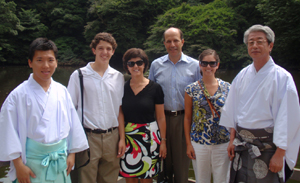
The Roos family visits Meiji Shrine shortly after arriving in Japan.
Susie Roos: First of all, I commend you for all your hard work both in the workplace and at home. I know that what you are doing is not easy. The availability and affordability of daycare services is also a challenge for American women. I do not know of an easy solution, but I hope that our societies can value daycare service providers as important professionals since they are protecting our most precious future assets – our children. As for the “psychological challenge of being a good mother,” I would encourage you to think about the good example you are showing your children by your strong work ethic. My children, between complaining that dinner may be a bit late, actually love the fact that I work and have my own business. They are so very proud of me and I know that was a great example for my daughter who followed in my steps and became a professional with her own career. Please encourage your children as early as possible to do things for themselves at home. It will help you, and they will feel the pride of accomplishment. Whether your children are boys or girls, you are teaching them the important lesson that women can and should have equal opportunities in the workplace. My other piece of advice is for working mothers to encourage each other. It can really help a friend when you say, “I don’t know how you do it with work and kids, but you’re doing a great job.” So, from me to you, “I don’t know how you do it, but you are doing a great job.”
A reader in Tokyo: As you started to pursue both your career and your family life, how did you and your husband share the burden of housework and the responsibility of raising your children? As you might already know, the greatest problem for women in Japan who want to pursue their own dreams as men do is that most Japanese men still consider housework and raising children to be merely women’s work, dumping all the responsibilities onto women. How did you survive?
Susie Roos: John has made me promise not to reveal how he really is at housework, but he does love taking care of the kids. He was willing to do anything for the kids, so I was lucky. I was still primarily responsible for making the plans, signing the kids up for activities, making the doctor’s appointments, etc., but if I couldn’t go to an appointment with them, John would do it. Housework – that’s a different story… but he is willing to do the laundry. Again, I was really lucky to have help. So for women who have to do it all, I applaud you!
A reader in Nagasaki: I am a citizen of Nagasaki and have been involved as a volunteer in the sister city activities of Nagasaki and Saint Paul in the U.S. I would like to ask you a question about peace education in the U.S. Is sufficient time allocated for teaching children about peace and war? I think worldwide peace education for children is very important for the realization of a peaceful world and for the future of the children. I’ll look forward to your answer.
Susie Roos: I am very happy to hear of your volunteer activities in the sister city program. I am a great believer in the real power of grassroots, person-to-person diplomacy represented by the sister city system to strengthen the connections between our two countries. In the United States, our public school system is run on a local, rather than national basis. My husband and I were very involved in the local school board when our children were young. John actually ran for and was on the local school board for 8 years. Although we do not have a national curriculum, I think that many parents in the United States feel as you do, that it is important for children to learn about war and peace, to have an understanding of history, and to be encouraged to think about ways to contribute to peace in the world.
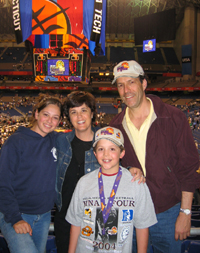
At a basketball event in San Antonio, Texas
A reader in the U.S: How do you manage to switch back and forth between your roles as a wife, mother, and working woman? Is there a special trick to it or something in particular you do to achieve balance?
Susie Roos: I don’t know that I ever “switch back and forth” since I am always a wife, mother, and working woman – all three at the same time. Nor do I have a “special trick” to achieve balance. What I do think helps me cope with all three roles at once is maintaining a sense of humor. And of course, having a great husband and great children. I don’t mean to be corny, but having a partner who values your ability to be a wife, mother, and working woman and respects you for it makes a big difference. So I guess I have to give John a lot of credit.
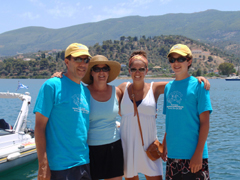
On a family vacation in Greece
A reader in Ibaraki: Have you ever had an opportunity to ride in an airship (blimp)? I think the floating sensation of riding in an airship would be a great way not only for working women but for anyone to relieve stress and get a completely new outlook on life. There are only three locations in the world that offer airship tours – one in San Francisco and two in Tokyo.
Susie Roos: Your question is a very interesting one. As a matter of fact, when John and I were married, we rode in a hot air balloon. It was quite something gliding through the air looking down on the fields of sunflowers in North Dakota where we got married. While I have not yet had the experience of riding in a blimp, I agree with you that it is important to do things to relieve stress and get a new outlook on life. I do like the overview of the landscape that one gets in an airplane or tall building. I did not know that San Francisco and Tokyo were the only cities where airship rides are offered, but I do think that both San Francisco and Tokyo are wonderful cities to live in. I feel privileged to have had the opportunity to experience both.
Many thanks to our readers who submitted questions for Susie Roos. We are sorry we couldn’t use all of them.







COMMENTS1
i Love this topic!
LEAVE A COMMENT
TOP